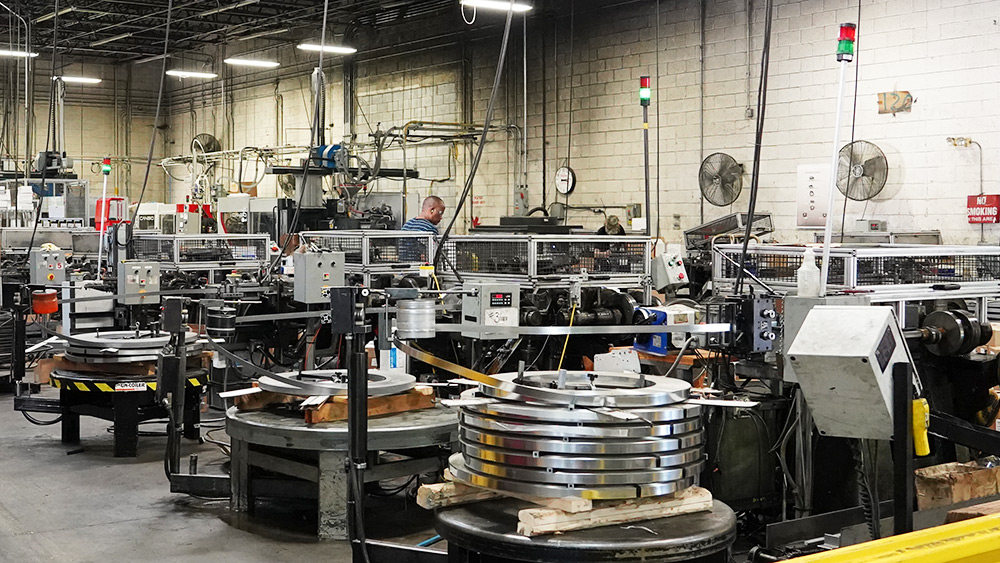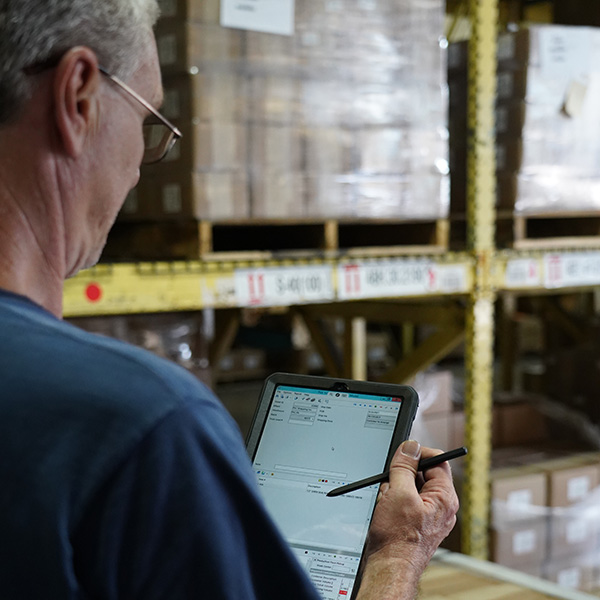Automating Manufacturing Processes That Positions the Business for Growth
Manufacturing automation helped PAC Strapping exceed revenue forecasts while positioning the company for its next stage of growth
The Need
PAC Strapping Products’ plans for expanding the business were being held back by manual approaches to managing inventory, billing, pricing, orders, and other processes, which led to errors, delayed customer payments, and days to weeks of extra work for employees.
The Solution
Using the DELMIAWorks ERP system, PAC Strapping has automated its processes and now maintains a single set of data across the business. This has resulted in improved customer relationships, stronger financials, and greater employee efficiency—while positioning the company for its next stage of growth.
The Results
- Reduced time to update customer pricing from 100-120 hours to 2 hours.
- Reduced receivables >90 days from 15% to just 5% of overall AR.
- Cut the order entry process from one day to 30 minutes.
- Improved the accuracy of sales quotes.
- Transformed the daily billing from a four hours to 15 minutes.
Automating Operations to Keep Pace With Expanded Business Growth
Headquartered in Exton, PA, PAC Strapping Products, Inc, is a full-service master distributor and manufacturer of plastic and steel strapping, systems, tools and accessories. Since its founding in 1982, PAC has focused on providing superior value by supplying customers with a full line of quality products, on-time delivery, competitive pricing, and innovative solutions.
For years, PAC had largely relied on manual processes to drive its business operations. However, as the management team began mapping out a strategy for expanding the business across both traditional customers and new markets, they realized that they would need to automate their operations to keep pace. An evaluation of enterprise resource planning (ERP) systems led the company to select the DELMIAWorks manufacturing ERP system.

A few months later, the DELMIAWorks system went into production. Three weeks later, the Pennsylvania government began a statewide shutdown to combat the pandemic and required all non-essential employees within manufacturing firms to work from home. Although PAC was still in the process of training employees on how to use it, the management team quickly determined that delaying use of the new DELMIAWorks ERP system was not an option.
“We could have waited six months, and we would just be that much further behind. And I don’t know how functional our business would have been using the old system; it was so paper-dependent,” recalled PAC Vice President and General Manager Marc Albero. “So, we started using the new DELMIAWorks ERP system and building our experience on it. Getting onboarded back then has made our business stronger today.”
Taking Control of Inventory, Costs and Pricing
Perhaps the biggest game changer for PAC has been implementing the DELMIAWorks inventory module. Not only does it give the company up-to-date visibility of inventory; it also provides insights into associated costs and assists with pricing.
In the past, PAC had cost estimates, but it was difficult to pinpoint the exact numbers in order to understand how they could be improved. The company now uses the inventory module’s costing functionality to address questions, such as:
- What does it mean to change our standard quantities in the system?
- What does it mean to optimize our cycle times to match what’s truly happening on the floor?
- What happens when we put in time for labor, and how does that affect the total cost basis?
...the DELMIAWorks inventory module process has helped us tremendously to not only better understand what our real costs are, but also to fine tune and really dig into what is driving our cost performance.
“The way items and standard costing are part of the DELMIAWorks inventory module process has helped us tremendously to not only better understand what our real costs are, but also to fine tune and really dig into what is driving our cost performance,” Albero observes. “Now we’re looking at every item and every process to see how we can improve it and really hone in on lower cost capabilities and production for all of our items.”
PAC also takes advantage of the pricing functionality in the DELMIAWorks inventory module, which helps the company to maintain pricing that is individualized for each customer. This capability has played an important role in ensuring that the company’s pricing keeps pace with the cost of materials, particularly during a year that has seen costs rise two-fold for steel, three-fold for lumber, and three-fold for polypropylene. Previously, it would take a PAC employee working 40 hours per week take 2-1/2 to 3 weeks to manually update the pricing for each customer. Now, using the inventory module to automate most of the work, the process takes about 2 hours. “We have had to go through seven or eight different product category price increases in the past year, alone. I can’t tell you how much the inventory module in DELMIAWorks has helped us to maintain our margins by quickly updating prices for our customers to align with the new costs,” Albero says.
Enhancing Customer Engagement via CRM and EDI
To enhance PAC’s interactions with customers, the business takes advantage of both the inventory and customer relationship management (CRM) modules in DELMIAWorks.
“When we’re talking with customers, it’s important to know that we have a product in inventory, can match that product to the customer, and can ship it. DELMIAWorks puts that information at our fingertips,” Albero notes.
Meanwhile, the CRM module’s quoting and opportunity management capabilities are helping PAC to create a seamless customer experience whether talking with someone from sales or customer service.
In the past, the quote for a customer might be shared via an email, leading to delays or disconnects in following up with customers. Today, quotes are created and stored in the CRM system, allowing a customer service rep to look up the quote in the system, confirm that the customer wants to proceed with the purchase, and use the quote to generate a sales order. Additionally, PAC is utilizing the opportunity management functionality to answer questions when planning and budgeting.
...it’s important to know that we have a product in inventory, can match that product to the customer, and can ship it.
DELMIAWorks puts that information at our fingertips.

“With the DELMIAWorks CRM module, there are a lot of nice features that we’re starting to take advantage of,” Albero says. “I like that I can use the opportunity log to understand where we’re going in the next year, where are growth is coming from, and what our big-ticket items will be. These types of insights can really help drive our next level of growth.”
PAC also has used the electronic data interchange (EDI) solution provided by DELMIAWorks to implement EDI for its largest customer, improving the timeliness and accuracy of communications. Previously, PAC simulated an EDI experience using the customer’s portal, but billing had to be handled offline, which led to disconnects between the two companies. Now, with standard EDI in place, the customer’s order and pricing match the order and pricing in PAC’s ERP system, and the information is carried through to the pack slip. Then once inventory is verified, a PAC employee simply clicks a button to send the EDI advance shipping notification to the customer.
“With our biggest customer, the old entry process used to take one person an entire day. Now with EDI, it’s a half an hour,” Albero explains. “Based on our initial success, we are already getting one of our other large customers onto EDI, and we’re looking to add support for additional customers that have expressed interest. Each time we move a customer onto EDI, it provides big benefits to both of us.”
Improving Accounts Receivable
One key benefit of using the DELMIAWorks EDI solution in combination with the ERP system’s automated invoicing is higher accounts receivable (AR) accuracy. With PAC’s old system, all of the invoicing was manual. So even if an order had the correct price, sometimes the person handling invoicing entered an incorrect price. By contrast, the DELMIAWorks ERP system automatically generates the invoice from the order, which has the correct pricing, eliminating any consistencies. Additionally, where EDI is in place, the communications ensure that PAC’s and the customer’s information match.
The accuracy of the automated invoicing has nearly eliminated the need to issue credits for pricing errors, and it has significantly reduced questions from customers about their invoices. As a result, the amount of accounts receivable over 90 days has been cut from 15% down to 5% of overall AR.
“With the automated invoicing and EDI provided by DELMIAWorks, the invoice is correct and goes directly to the customer,” Albero explains. “We don’t have collection problems anymore. The customer just pays the bill because there’s nothing to question on the invoice.”
Optimizing the Workforce for Growth
As PAC looks to expand the business, the company is focused on increasing productivity as well as attracting and retaining employees. The ERP system from DELMIAWorks has enabled employees across the organization to accomplish routine tasks significantly faster. For example, the old manual billing process used to be a four-hour exercise. Now, using the ERP invoicing module, an employee can verify the packing slip, inventory, and whether the order has shipped—cutting the billing process to just 15-minutes.
The ability to access the DELMIAWorks ERP system remotely has also contributed to employees’ productivity, enabling team members in sales, customer service, accounting, human resources, and other back-office operations to work remotely. Notably, employees with dependent children at home have been able to continue working even when they were unable to rely on outside support or facilities.
“It’s hard to imagine how we could have continued business as usual with our old paper-based system, but with our DELMIAWorks ERP system, we figured out how to go remote in less than a week, Albero says. “We’re really proud that we have been able to keep everybody employed, and also enable them to do what they need to do to take care of their families.”
Albero adds, “Since implementing DELMIAWorks, we’ve seen our revenue exceed our original forecast, and we have started adding new employees. We’re now looking at how we can expand our use of the ERP system to further support our growth.”

More on PAC Strapping Products
Headquartered in Exton, PA, PAC Strapping Products, Inc, is a full-service master distributor and manufacturer of plastic and steel strapping, systems, tools and accessories. Since its founding in 1982, PAC has focused on providing superior value by supplying customers with a full line of quality products, on-time delivery, competitive pricing, and innovative solutions.
For more information: https://strapsolutions.com/
DELMIAWorks Additional Resources
Resource Center
Access brochures, case studies, testimonial videos, whitepapers, eSeminars (Webinars On-Demand), and more.
DELMIAWorks User Community
Online community of DELMIAWorks users (3DEXPERIENCE Platform login credentials required)
Training & Services
Learn more about DELMIAWorks Software Training Programs and Solution Consulting Services.
Have questions about DELMIAWorks Manufacturing ERP Solutions?
DELMIAWorks solutions solve your manufacturing challenges by connecting the entire design to manufacture process.


